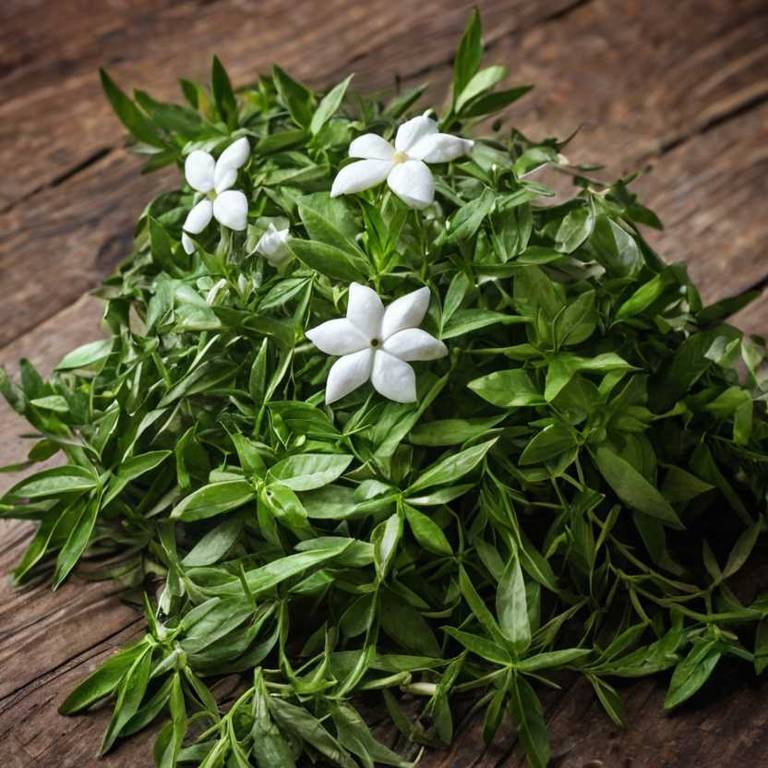By Leen Randell
Updated: Jul 07, 2024
What Are The Medicinal Properties Of Gardenia Jasminoides (Cape Jasmine)?

Gardenia jasminoides, also known as cape jasmine, has health benefits such as reducing inflammation and stress, improving cardiovascular health, and acting as an antiseptic.
The herb's medicinal constituents include flavonoids, saponins, and iridoids, which are responsible for its therapeutic effects. Preparations of cape jasmine include tea, extract, and infusions, often used in traditional Chinese medicine. Possible side effects include gastrointestinal upset and allergic reactions.
Precautions include pregnant or breastfeeding women and individuals with allergies, who should consult a healthcare professional before using cape jasmine.
This article explains the health benefits, active constituents, medicinal preparations, possible side effects, and precautions related to Gardenia jasminoides.
- What are the health benefits of Gardenia jasminoides?
- What are the active constituents of Gardenia jasminoides?
- What are the medicinal preparations of Gardenia jasminoides?
- What are the possible side effect of using Gardenia jasminoides improperly?
- What precautions to take when using Gardenia jasminoides medicinally?
What are the health benefits of Gardenia jasminoides?
Gardenia jasminoides, also known as cape jasmine, has health benefits such as lowering cholesterol levels and reducing blood pressure due to its rich content of flavonoids and saponins.
Its extracts have been shown to exhibit anti-inflammatory properties, which may help alleviate symptoms of arthritis and other inflammatory diseases.
Additionally, cape jasmine is rich in antioxidants, which can help protect against oxidative stress and promote overall well-being.
Here's a detailed article about the 10 health benefits of Gardenia jasminoides.
What are the active constituents of Gardenia jasminoides?
Gardenia jasminoides, also known as cape jasmine, has active constituents such as flavonoids, triterpenoids, and alkaloids.
Flavonoids, including kaempferol and quercetin, possess antioxidant properties, while triterpenoids, like gardosides and jasminosides, exhibit anti-inflammatory and hepatoprotective activities. Alkaloids, including gardenoside, may display antimicrobial and cardiovascular benefits.
The combination of these constituents contributes to the plant's traditional uses in treating various health conditions, including fever, indigestion, and anxiety.
Here's a detailed article about the 10 active constituents of Gardenia jasminoides.
What are the medicinal preparations of Gardenia jasminoides?
Gardenia jasminoides, also known as cape jasmine, has medicinal preparations such as infusions and decoctions, which are used to treat various health conditions.
The flowers, leaves, and seeds of the plant are traditionally used to treat digestive issues, such as constipation and indigestion. The plant is also valued for its anti-inflammatory and antioxidant properties, which are believed to help alleviate symptoms of fever, sore throats, and skin irritations.
These preparations are commonly used in traditional Chinese and Ayurvedic medicine.
Here's a detailed article about the 10 medicinal preparations of Gardenia jasminoides.
What are the possible side effect of using Gardenia jasminoides improperly?
Improper use of Gardenia jasminoides, also known as cape jasmine, increases the chances of experiencing side effects such as skin irritation, allergic reactions, and gastrointestinal problems.
Ingesting large quantities can lead to vomiting, diarrhea, and stomach cramps. Some individuals may also experience headaches or dizziness due to the plant's potential toxicity and interaction with certain medications.
Pregnant women and children should exercise caution when handling or consuming the plant.
Here's a detailed article about the 10 most common side effects of Gardenia jasminoides.
What precautions to take when using Gardenia jasminoides medicinally?
Before using Gardenia jasminoides, also known as cape jasmine, for medicinal purposes, you must take precautions such as consulting with a qualified healthcare professional to determine the proper dosage and usage.
The plant's seeds, leaves, and roots may be toxic and cause gastrointestinal upset if ingested in excess.
Pregnant and breastfeeding women should avoid using the plant altogether, as its effects on fetal development and infant health are not well understood.
Here's a detailed article about 10 precautions to take when using Gardenia jasminoides.